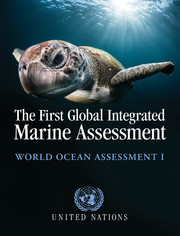Book contents
- Frontmatter
- Dedication
- Epigraph
- Contents
- Foreword and Preface
- Preface
- Summary of the first global integrated marine assessment
- The context of the assessment
- Assessment of Major Ecosystem Services from the Marine Environment (Other than Provisioning Services)
- Assessment of the Cross-cutting Issues: Food Security and Food Safety
- Assessment of Other Human Activities and the Marine Environment
- Assessment of Marine Biological Diversity and Habitats
- Section A Overview of Marine Biological Diversity
- Chapter 36 Overview of Marine Biological Diversity
- Section B Marine Ecosystems, Species and Habitats Scientifically Identified as Threatened, Declining or Otherwise in need of Special Attention or Protection
- I Marine Species
- II Marine Ecosystems and Habitats
- Section C Environmental, economic and/or social aspects of the conservation of marine species and habitats and capacity-building needs
- Overall Assessment
- Chapter 54 Overall Assessment of Human Impact on the Oceans
- Chapter 55 Overall Value of the Oceans to Humans
- Annexes
- References
Chapter 55 - Overall Value of the Oceans to Humans
from Overall Assessment
Published online by Cambridge University Press: 18 May 2017
- Frontmatter
- Dedication
- Epigraph
- Contents
- Foreword and Preface
- Preface
- Summary of the first global integrated marine assessment
- The context of the assessment
- Assessment of Major Ecosystem Services from the Marine Environment (Other than Provisioning Services)
- Assessment of the Cross-cutting Issues: Food Security and Food Safety
- Assessment of Other Human Activities and the Marine Environment
- Assessment of Marine Biological Diversity and Habitats
- Section A Overview of Marine Biological Diversity
- Chapter 36 Overview of Marine Biological Diversity
- Section B Marine Ecosystems, Species and Habitats Scientifically Identified as Threatened, Declining or Otherwise in need of Special Attention or Protection
- I Marine Species
- II Marine Ecosystems and Habitats
- Section C Environmental, economic and/or social aspects of the conservation of marine species and habitats and capacity-building needs
- Overall Assessment
- Chapter 54 Overall Assessment of Human Impact on the Oceans
- Chapter 55 Overall Value of the Oceans to Humans
- Annexes
- References
Summary
Introduction
The ocean provides countless ecosystem services. The Millennium Ecosystem Assessment describes ecosystem services as “the benefits people obtain from ecosystems” (MEA, 2005). Some of the ecosystem services from the ocean are delivered without human intervention – though they can be affected or disrupted by such intervention. Examples of these are the regulating and supporting ecosystem services (as described in Chapter 3), such as distribution of heat around the planet, the functioning of the hydrological cycle and the absorption of carbon dioxide as part of the carbon cycle. Other ecosystem services are obtained as a result of human activity to acquire the benefits. Most of these are provisioning ecosystem services (as also described in Chapter 3). The obvious example of such acquired ecosystem services is the food provided by capture fisheries, where humans take from the ocean significant amounts of the protein required for human diets. As demonstrated in Part IV and Part V and in Chapter 54, if the human activities are not carefully managed to maintain ecosystem structure and function, the acquisition of such ecosystem services can result in damage to the marine environment and reduction or loss of ecosystem services. Important issues arise for the institutions of ocean governance at global, regional, national and local levels in balancing the benefits of acquiring these services against the disbenefits (referred to by some as detriments) caused by over-exploitation and in preventing or mitigating those disbenefits.
Very different aspects of the concept of value are brought into play by these different kinds of ecosystem services. For most of the ecosystem services obtained from the ocean by human effort, there are global or local markets for the products obtained. Market valuations are therefore possible, although in some cases questions arise whether such a market value captures all the facets of the value to humans. For example, the value of fish in the sea in maintaining biodiversity and ecosystem functions may be more than the market value of the fish if they were caught and sold for consumption. Or, on a lesser scale, the value of their activities to recreational sea anglers may well be more than the market value of the fish (if any) that they catch. For ecosystem services that do not involve human effort to benefit from them, there is no market, and it is a question of producing a valuation in other ways.
- Type
- Chapter
- Information
- The First Global Integrated Marine AssessmentWorld Ocean Assessment I, pp. 945 - 952Publisher: Cambridge University PressPrint publication year: 2017

